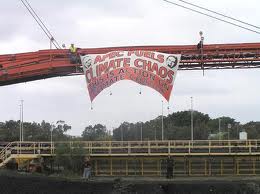In Australia business people attending the Third Annual Pollution Law Conference in 1991 were presented with a paper entitled Legal Rights of Industry Against Conservationists which advised them about legal action that could be taken against environmental activists. Conference attendees were told about developments in the US which were relevant to Australia, including the widespread use of lawsuits to intimidate environmentalists.
While legal aid to low income litigants is being cut back in Australia, companies receive a massive subsidy for their legal expenses through being able to claim them as tax deductions, no matter how much merit a case has or how much they spend on lawyers.
 In 2004 the Australian Wool Innovation (AWI), a wool industry research group, sued the US-based People for the Ethical Treatment of Animals (PETA) which was campaigning against sheep mulesing, an Australian practice whereby sheep have strips of skin removed from their buttocks to prevent potentially fatal flystrike, without any painkillers or anaesthetic.
In 2004 the Australian Wool Innovation (AWI), a wool industry research group, sued the US-based People for the Ethical Treatment of Animals (PETA) which was campaigning against sheep mulesing, an Australian practice whereby sheep have strips of skin removed from their buttocks to prevent potentially fatal flystrike, without any painkillers or anaesthetic.
 Initially AWI alleged that woolgrowers had lost money as a result of PETA's international campaign against mulesing, in particular its efforts to get companies to boycott Australian wool products. PETA had succeeded in getting fashion retailers Abercombie & Fitch and Liz Claiborne, as well as UK department store chain John Lewis and others, to boycott Australian merino wool. However wool prices were rising, so AWI downgraded its claim to $10 million in damages resulting from PETA's claims that it argued were "misleading and deceptive conduct" under the Australian Trade Practices Act.
Initially AWI alleged that woolgrowers had lost money as a result of PETA's international campaign against mulesing, in particular its efforts to get companies to boycott Australian wool products. PETA had succeeded in getting fashion retailers Abercombie & Fitch and Liz Claiborne, as well as UK department store chain John Lewis and others, to boycott Australian merino wool. However wool prices were rising, so AWI downgraded its claim to $10 million in damages resulting from PETA's claims that it argued were "misleading and deceptive conduct" under the Australian Trade Practices Act.
AWI also sued Animal Liberation NSW, whose meetings had been infiltrated, and two individuals who showed an anti-mulesing video from an educational van.
In 2007 AWI dropped its case after a deal was made with PETA. PETA would stop calling for boycotts of stores selling Australian wool products and Australian woolgrowers would stop mulesing by 2010.
 In 2010, seven global warming protestors, who were amongst a group of 40 that managed to shut down two coal loading terminals for several hours in Newcastle, NSW, were sued by Port Waratah Coal Services (PWCS) for more than $500 million in lost profits.
In 2010, seven global warming protestors, who were amongst a group of 40 that managed to shut down two coal loading terminals for several hours in Newcastle, NSW, were sued by Port Waratah Coal Services (PWCS) for more than $500 million in lost profits.
The legislation being used for the law suit is the NSW Victim's Support and Rehabilitation Act, "a law intended to protect victims of violent crime", for which average compensation is $12,300. Clive Hamilton, professor of public ethics, noted:
In an Orwellian inversion of the meaning of words, corporate goliaths whose activities threaten the conditions of life on earth - whose daily business is already, according to the World Health Organisation, contributing to tens of thousands of deaths around the world each year - claim they are being victimised.
In 1997 Miles Lewis, a Melbourne University lecturer in architecture, was sued by property developer Lloyd Williams for calling him "a cowboy ... who doesn't take any notice of the law" in the Age newspaper, because Williams had constructed an apartment building without the required permits. Neither the newpaper nor the University supported him in the first year of the case. At the time Williams was constructing the controversial Melbourne Casino:
The proceedings were intimidating, and community debate was suppressed. And the timing of this case was instructive. The writ was issued within days, but not hurried to a hearing. It continued to hover over the debate concerning the casino until there was nothing left to debate, because the casino was already a fact of life.
In Australia various legal means have been used against protesters involved in civil disobedience. In one case five protesters superglued and bolted themselves onto logging machinery in Badja State Forest in NSW. They were charged with ‘intimidating’ the logger who was 600m away at the time. Normally such protesters have been charged with trespass but such charges are usually dismissed by the courts.
The criminal charge of ‘intimidation’ has been on the statute books for almost 100 years and carries with it the possibility of jail sentences. It was only recently discovered by local police who say they will use it more often in future. In 1993 the protesters were found guilty and fined $4000 in the first conviction of this kind. The Australian Council of Civil Liberties backed an appeal against the convictions saying that they were an “outrageous” interference with the “basic right to protest”.